LESSONS FROM A DECORATED CAREER: A Look Back at Decades of Leadership
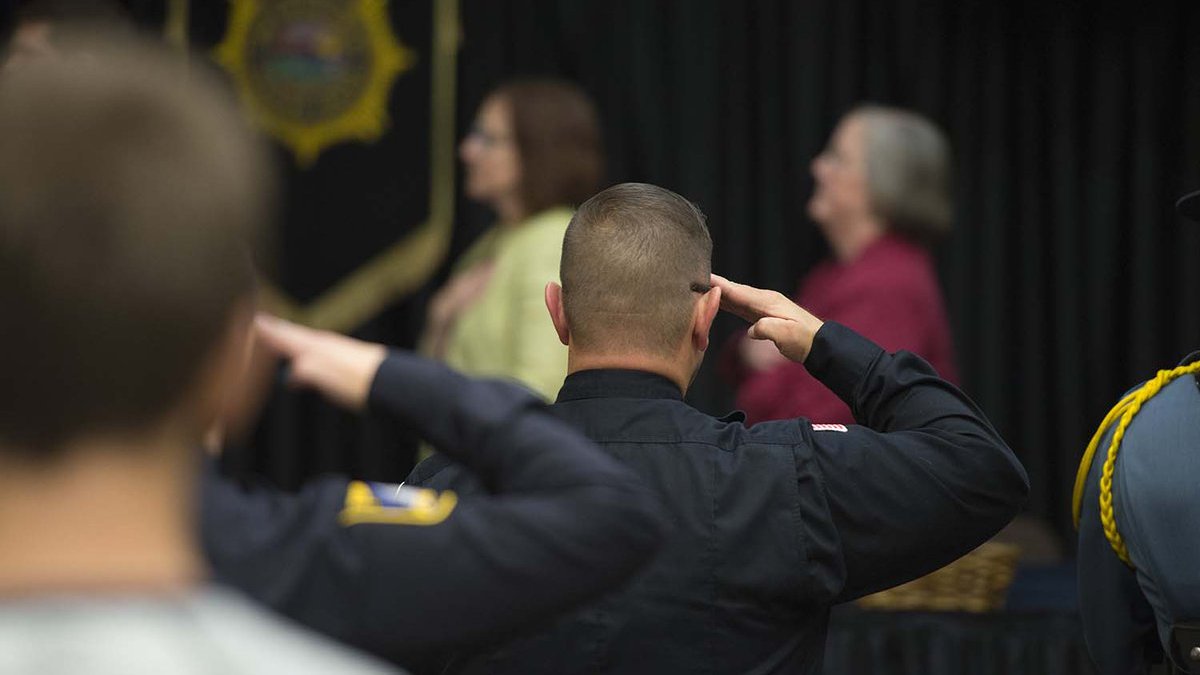
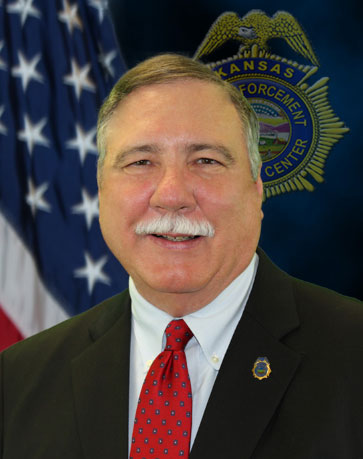
If you want to get a sense of the depth and breadth of Ed Pavey’s career at the Kansas Law Enforcement Training Center (KLETC), consider these two numbers:
• 8,000: That’s how many law enforcement officers there are in the state of Kansas, serving at 431 agencies.
• 10,000: That’s roughly how many officers have trained at KLETC during Pavey’s 23-year tenure as director.
Encounter a police officer or sheriff’s deputy in Kansas, in other words, and the odds are good that Pavey helped shape their career.
"He's probably touched everybody's career in some way,” said Darin Beck, who was recently announced as the new executive director of KLETC. “Probably in ways they don't even know."
Pavey’s impressive run is about to end, however. He retires in June, ending a tenure spanning nearly half the KLETC’s 50-year history and which saw the center outside Yoder, Kansas, evolve from a sleepy two-building campus into a modern facility with 15 buildings and a reputation for cutting-edge education.
"I think he's been a tremendous leader for Kansas law enforcement,” said Shawnee County Sheriff Herman T. Jones. “He's been very instrumental in the development of Kansas law enforcement officers for many years."
Pavey said the center’s accomplishments during his tenure were a team effort.
“This place would not be what it is without our staff,” he said. “We've assembled a staff that is second-to-none.”
He added: “It’s been a great job.”
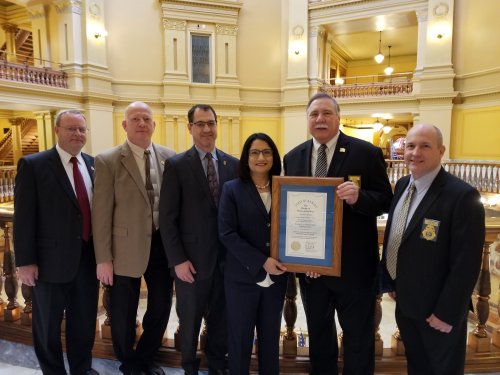
‘A Quality Product’
Pavey has led KLETC, a unit of KU Professional & Continuing Education, which serves as the headquarters for all law enforcement training in Kansas, since 1995. He served as acting director for a year before that, and has been on staff since 1989, following a career in the Sedgwick County Sheriff’s Department. He is just the third director in the history of the training center, which was established in 1968.
"KLETC has had three directors — by far, Pavey was there the longest,” said Jackie Williams, a former U.S. Attorney for Kansas who now serves as the state’s deputy attorney general for the Medicaid Fraud and Abuse Division. “The way he constantly improved KLETC — the grounds, but also the programs — was a highlight."
Pavey oversaw the expansion of the campus, from its original two buildings – inherited from a World War II-era naval air base that previously occupied the site near Yoder – to a modern, 15-building facility including a 63-room and 54-room residence halls with 231 beds, state-of-the-art electronic training simulators, and a 1.78-mile driving course, all situated in a 173-acre site.
"He's done a stellar job,” said Brad Schoen, director of the Riley County Police Department. “It's one thing to improve facilities, it's another to do it in lean financial times."
Those improvements are more than just cosmetic, Pavey said. “These enhancements have helped us better prepare Kansas officers to perform their duties in a sometimes challenging and ever-changing policing environment,” he said.
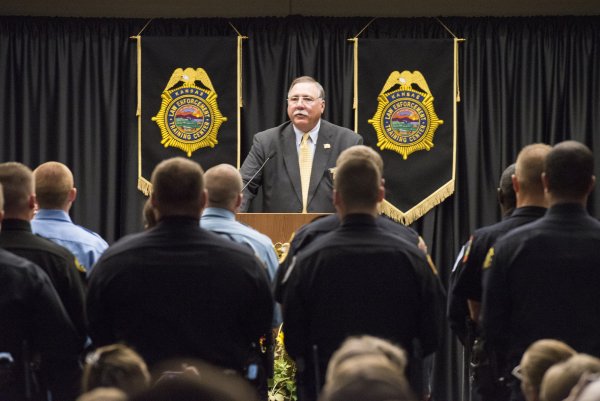
Indeed, more than 400 agencies across the state send new full-time officers to KLETC for intensive training that lasts nearly four months. A staff of 51 offers instruction on the law, communications, firearms and tactical training, as well as lessons in tactical driving on the center’s 1.78-mile emergency vehicle driving course.
What do these agencies get back from KLETC at the end of training? "They're getting a very well-trained, professional law enforcement officer,” said Gary Steed, executive director of the Kansas Commission on Peace Officers Standards and Training. “The training is up-to-date, professionally done and thorough. I'm always impressed with the quality of officer we get, in the amount of time we have to train them."
Kirk Thompson, director of the Kansas Bureau of Investigation, said his agents work with law enforcement agencies across the state. The training provided by KLETC under Pavey, he said, ensures the local officers meet common standards of professionalism.
"A lack of consistency could be problematic,” Thompson said. “What we see is good quality core training on the laws of this state. It makes our job a lot easier, to deal with individuals who have that level of competence."
Pavey also helped create ongoing distance training programs that let officers across the state keep up with developments in their profession without taking time away from their communities. About half of the state’s 431 law enforcement agencies have five or fewer officers, he said.
“They can't afford (to lose officers for weeks of training) if they're covering their community seven days a week, 24 hours a day, and they only have five full time officers,” Pavey said. “A better way is to start delivering training right into their local communities — let them get away for a couple hours in the courthouse, or the police station, alongside a computer and be able to watch the instructor.”
State Rep. John Carmichael, a Wichita Democrat, said Pavey raised the standard of law enforcement training in the state.
"He took major steps to turn Kansas law enforcement truly into a profession,” Carmichael said. "I don't know of any state that provides better basic training to new recruits than what they get at KLETC."
Pavey said he’s received a lot of support along the way.
“We've been blessed to have legislative support, university support, Board of Regents support,” Pavey said. ”It's just all the stars lined up over many years. And we're here today with a great facility, great staff and great training.”
Passion for Policing
Pavey’s defining characteristic? “He has a passion for serving others,” Jones said.
The passion started early. Before coming to KLETC as an assistant director in 1989, Pavey served on the Sedgwick County Sheriff’s Department for 21 years, rising from a teenage dispatcher to the rank of division commander.
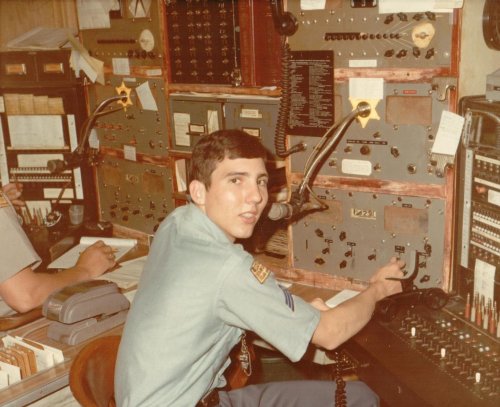
His career started when then-Sedgwick County Sheriff Vern Miller — who would later serve as Kansas attorney general — came to Wichita Heights High School, where Pavey was a student, and started a cadet program for kids interested in law enforcement. Pavey soon found himself hanging around the sheriff department’s dispatchers on weekends, taking calls.
“And then at age 17, Vern Miller offered me a full-time position working 3 p.m. until 11 p.m., five days a week as long as I kept my high school grades at a B average or above,” Pavey said. “And, I had to bring my report card each semester, showing that I was doing so. So, I got an early start.”
It was a start in law enforcement that wouldn’t be possible today. Pavey was on the streets as a deputy at age 20 — these days, the minimum age to be a Kansas law enforcement officer is 21. By 1976, he was a supervisor.
“You know what working the streets was? It was a pleasure, being able to go out and actually try to make a difference and work with people,” Pavey said.
Eventually, he became director of training for the department, and that led to his arrival at KLETC.
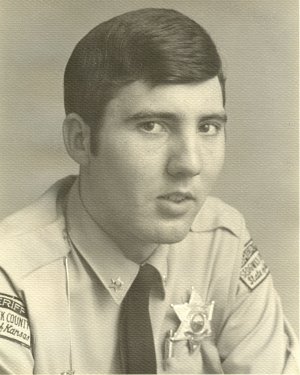
“I spent almost six years as the director of training for the department and training new recruits just like we're doing here,” Pavey said. “And that's where I met a gentleman by the name of Larry Welch who was an FBI agent in Wichita who, at the time, I didn't know would later become the director here at KLETC. And once he did, he started recruiting me from the sheriff's office to come work with him as his assistant director.”
While Pavey is just one of the three directors that has led KLETC over the past 50 years, he said that KLETC's leadership has truly been a team effort with those serving before him. His predecessors were Maynard Brazeal (1968-1989) and Larry Welch (1989-1994) — and Pavey says they, too, helped mold and shape KLETC to what it is today.
“Their leadership, commitment and dedication to KLETC and Kansas law enforcement training will long be remembered," he said.
Pavey’s work has been lauded over the years. His awards include the 1994 International Association of Chiefs of Police and National Highway Traffic Safety Administration’s J. Stannard Baker Award, the Wichita Crime Commission’s 1998 Criminal Justice Professional of the Year, and the 2002 FBI National Academy Associates Clarence M. Kelley Award. His other career highlights include a 1993 trip to St. Petersburg, Russia, to observe and consult with police there, as well as a 2009 trip to Armenia to meet and consult with Armenia’s national police.
Now Pavey is moving on. But he leaves a legacy that won’t soon be forgotten.
“His legacy lives on in each officer he has trained, and Kansas is a better place as a result of his leadership,” said Gov. Jeff Colyer.”
Pavey and his wife reside in Valley Center. They have three grown daughters, three sons-in-law, and nine grandchildren.
He hopes part of his legacy is leaving Kansas a safer state.
"We get emails in here from former trainees that say, 'Thank you to the instructors. They prepared me to get me out of a shooting situation tonight. I'm alive because of what you taught me at KLETC,’” he said. “That is a rewarding piece of information to our staff and to administrators, that we’re saving the lives of officers out there because of the training they are undertaking — that we're doing something right."
Discover Pavey's tips for staying innovate over the decades and cultivating relationships with stakeholders.
Learn more about KLETC, KU Professional & Continuing Education and its customizable, conference and professional development services.





